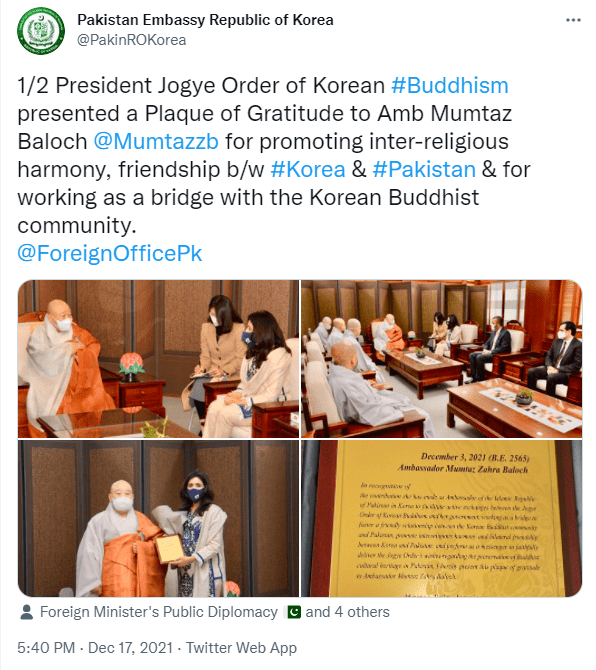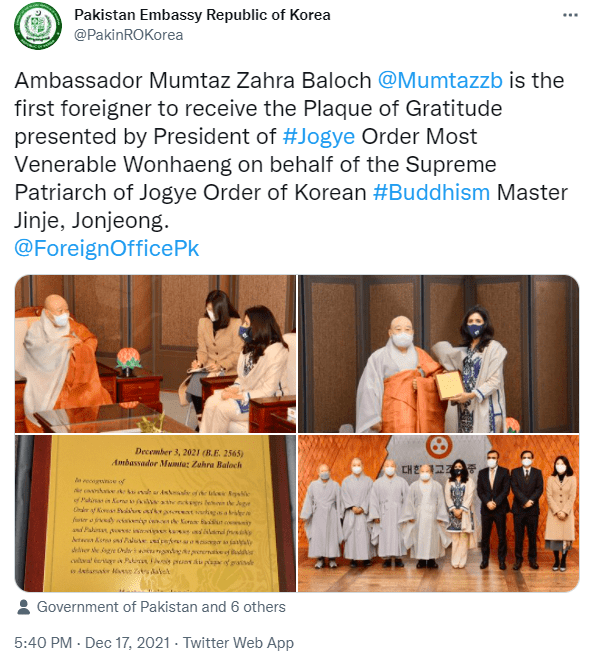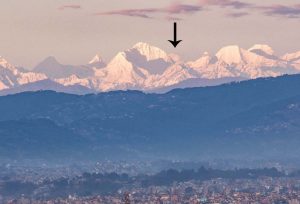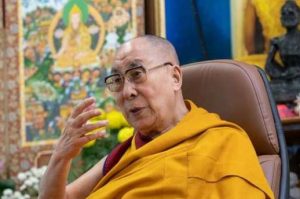The Jogye Order of Korean Buddhism has presented a Plaque of Gratitude to Mumtaz Zahra Baloch, Pakistan’s ambassador to South Korea, to acknowledge her work in fostering Pakistani-Korean ties. On Twitter, the Pakistan Embassy in South Korea Tweeted that Ven. Wonhaeng, the current president of the Jogye Order, met with Ambassador Baloch on 3 December in recognition of her work in promoting, “inter-religious harmony, friendship between South Korea and Pakistan, and working as a bridge with the Korean Buddhist community.” (Twitter)
Quoting the embassy’s Tweet, Ambassador Baloch wrote, “Truly humbled. No matter where I am and no matter what I do, I would continue to ‘act as a bridge’ to promote inter-religious harmony.” She has been ambassador to South Korea since 21 February 2020, with previous postings in Geneva and Washington, D.C.
Founded on 11 April 1962 but with a lineage dating back 1200 years, the politically influential Jogye Order of Korean Buddhism is South Korea’s representative order of traditional Korean Buddhism. Ambassador Baloch is the first non-Korean national to receive the Plaque of Gratitude from the order. (Twitter) Ven. Wonhaeng had presented the plaque to her on behalf of the Jogye Order’s Supreme Patriarch, Master Jinje, Jonjeong. The text reads:
In recognition of the contribution she has made as Ambassador of the Islamic Republic of Pakistan to facilitate active exchanges between the Jogye Order of Korean Buddhism and her government, working as a bridge to foster a friendly relationship between the Korean Buddhist community and Pakistan, promote interreligious harmony and bilateral friendship between Korea and Pakistan, and perform as a messenger to faithfully deliver the Jogye Order’s wishes regarding the preservation of Buddhist cultural heritage in Pakistan, I hereby present this plaque of gratitude to Ambassador Mumtaz Zahra Baloch.
(Twitter)
Islamabad and Seoul have long leveraged Buddhism as a cornerstone of cultural diplomacy. In an interview with Asia Society in 2020, Ambassador Baloch highlighted the importance of Buddhism as a link between Pakistan and South Korea:
“Gandhara civilization rooted in the northwest of Pakistan was the cradle of Buddhism from 6th Century BCE to 11th Century CE. It became the source of spread [sic] of Buddhism to Tibet and East Asia including Korea. Pakistan and Korea thus have deep Buddhist links. . . . In commemoration of these historic and religious links, late last year President Jogye Order [sic] headed a delegation of about 80 monks to Pakistan and paid pilgrimage to some of these historic sites. It was a spiritual journey which has caught the imagination of Buddhists in Korea and rest of the world. We therefore intend to introduce these historic and religious sites widely to encourage more Koreans to travel to Pakistan and see for themselves this rich heritage.”
(Asia Society)
Baloch acknowledged how the “third sector” of civil society (to which religious institutions belong) has an important role to play in bilateral diplomacy, noting that civic organizations help countries to “understand and appreciate each other and solidify bilateral relations in an effective and far-reaching manner. Promoting interaction between universities, think-tanks, and cultural associations has therefore become an essential aspect of diplomacy today.” (Asia Society) She noted that the Embassy of Pakistan was actively engaged in reaching out to the Korean civil society, especially academia, journalists, and think-tank experts.
Baloch also stated: “We are working to develop linkages between counterpart associations, women groups as well as student and youth organizations. This includes exchange of delegations and sports teams, cultural exhibitions, research on each other’s language, literature and culture and exchange of movies, drama and music.” (Asia Society)
Pakistan has also been able to cultivate ties with other countries through its Buddhist heritage. Just last month, the Italian Archaeological Mission to Pakistan (MAIP), led by Prof. Valeria Fiorani Piacentini, leader of MAIP, and field director Simone Mantellini, met with Sindh Minister for Culture and Education, Syed Sardar Ali Shah, to announce an “excavation season” beginning in November 2021. According to the website Dawn, Prof. Piacentini informed Mr. Shah that the excavation season would continue till the last week of December 2021. (Dawn)
“As usual, the excavation season will conclude with an awareness session, where all the technical details and findings of the excavation will be shared with people,” she said after her meeting. (Dawn) MAIP was founded by famed Buddhologist Giuseppe Tucci and has been excavating ruins of the ancient town of Bazira since 1984. (Agenzia Giornalistica Italia)
Ambassador Baloch has continued to discuss with the Jogye Order about exploring options to promote Buddhism, though some of these projects have been delayed due to the pandemic.
See more
Pakistan Embassy Republic of Korea (Twitter)
Interview with H.E. Mumtaz Zahra Baloch (Asia Society)
Pakistan-Italy archaeological mission launches excavation season (Dawn)
Pakistan unearths the city defeated by Alexander the Great (Agenzia Giornalistica Italia)
Italian Archaeological Mission to Pakistan
Related news from Buddhistdoor Global
Pakistan’s Surviving Buddhist Communities in Danger of Extinction
Archaeologists Unearth Ancient Buddhist Complex in Pakistan
Four Arrested in Pakistan for Destroying 1,700-year-old Buddha Statue
Ancient Buddhist Rock Carvings in Pakistan Vandalized
Korea’s Jogye Order to Establish Buddhist Temple in Pakistan
Korean Monks, Researchers Visit Buddhist Sites in Pakistan















